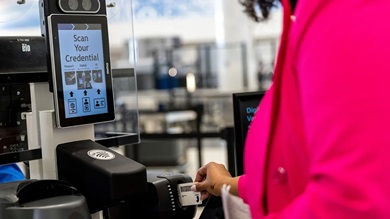The Transportation Security Administration (TSA) is testing the use of facial recognition technology at select airports across the country to enhance security and speed up procedures.
The pilot program is currently in place at some TSA checkpoints at 16 airports in Baltimore, Washington, D.C., Atlanta, Boston, Dallas, Denver, Detroit, Las Vegas, Los Angeles, Miami, Orlando, Phoenix, Salt Lake City, San Jose, and Gulfport-Biloxi and Jackson in Mississippi.
With 2.4 million airline passengers daily, the agency says the goal of the program is to improve the accuracy of identity verification and keep passengers moving through checkpoints smoothly.
“What we are trying to do with this is aid the officers to actually determine that you are who you say who you are,” Jason Lim, identity management capabilities manager, said. TSA says the pilot program is voluntary and accurate, but critics have raised concerns about questions of bias in facial recognition technology and possible repercussions for passengers who want to opt out.
In a February letter to TSA, five senators — four Democrats and an Independent who is part of the Democratic caucus — demanded the agency stop the program, saying, “Increasing biometric surveillance of Americans by the government represents a risk to civil liberties and privacy rights.”
Lim said that the agency takes privacy and civil rights concerns “very seriously,” and that images are not compiled into a database and confirmed that photos and IDs are deleted.








